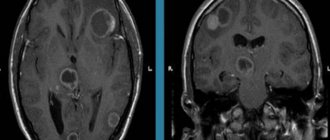Causes of alexithymia
Modern experts distinguish two forms of violation: primary and secondary. Primary alexithymia is congenital and is associated with deficits in certain areas of the brain; secondary alexithymia is considered acquired. The causes of the disorder will depend on its form.
The following causes are identified for primary alexithymia:
- congenital malformations of the fetus, in particular of the brain;
- birth injuries;
- infectious processes suffered during pregnancy;
- the hereditary nature of alexithymia, that is, similar traits can be observed in close relatives.
Causes of secondary (or acquired) alexithymia:
- mental illness (ASD, schizophrenia);
- neuroses, hidden depression;
- stress, constant nervous tension;
- suffered psychological trauma;
- brain injuries, central nervous system;
- severe infectious diseases that affect the functioning of the brain and central nervous system.
Alexithymia, according to many researchers, can also arise as a result of improper upbringing: over- or under-custody, inattention to the child’s feelings. Researchers also note the influence of stereotypes accepted in society. This includes “men don’t cry” and “it’s indecent to express your feelings in public.”
Alexithymia
What is alexithymia? or Alexithymia as a psychological problem
Alexithymia – what is it? If we translate this term literally from Greek (аlexithymia: a – negation + lexis – speech, word + thymos – mood, feelings), we will get “speechlessness,” a strange term meaning absence of feelings, difficulties in defining and expressing emotional states in words . So alexithymia literally refers to the inability to describe one’s emotions in words . It seems that there is nothing wrong with this, where is the psychological problem - these are emotions, why define them in words, they must be felt?
It turns out that a person's inability to describe their own emotions in words leads to an inability to recognize them, as well as their feelings or anxiety. And the inability to realize your emotions does not allow you to understand the experiences and feelings of other people and empathize with them. In this case, the world gradually becomes poor in feelings and rich in events; they come to the fore to the detriment of internal experiences, and over time the person ceases to be emotionally involved in the objective situation. As a result, he does not live it, does not take his personal experience out of it.
This is a limitation of sensory connections with the world, and it reduces the ability to distinguish feelings from bodily sensations, respond adequately in stressful and conflict situations, understand the world in all its complexity and construct an imaginative context of the situation. Therefore, a person has the feeling that he is being haunted by failures in his activities, perhaps real, and perhaps existing only in his consciousness. And these failures begin to acquire greater emotional significance and personal meaning for a person than achieving the goal. And then the motivational sphere is distorted, semantic accents are shifted, and it is they that largely determine a person’s relationship with the surrounding reality.
Do you now see alexithymia as a psychological problem? Hope so. Now let's move on to studying its causes, signs and possibilities for “treatment”.
How does alexithymia manifest?
Typically, alexithymia manifests itself in this way: you “have no words” to express feelings, or you find it difficult to identify an emotionally charged situation that is significant for your inner mental life, or you are unable to explain, tell what is happening to you at the level of feelings. Usually, with alexithymia, you rarely have dreams and they are dim and fragmentary.
What does this look like in real life? If, for example, a person who is just sitting in a chair is asked the question: “What are you feeling now?”, he will often answer: “Nothing. How can I feel if nothing happens around me? I feel that the chair is soft...” or will begin to describe his actions: “I’m sitting in a chair. I’m looking at the picture on the wall” or to the description of the situation: “The weather outside is good. There is a picture on the wall…". Instead of saying: “I feel joy because the weather outside is good and there is a beautiful picture on the wall...”
How does alexithymia occur or Causes of alexithymia:
Alexithymia can be a permanent personality trait, or it can be a temporary reaction to depression or anxiety. If this is a human trait, then its development begins in adolescence. If you do not teach a child to talk about how he feels, how he expresses it, then he will not learn to empathize. And parents often not only do not ask the child about his feelings, but, on the contrary, teach them to hide them in every possible way, demonstrating by their example appropriate behavior. And people grow up with the ability to realize and express feelings that have not developed at the right age - people with primary alexithymia.
But alexithymia can also be secondary. It develops as a result of the predominance of defense mechanisms in the process of personality development. That is, if the expression of feelings in the past brought a negative result - pain, fear, guilt, and so on, the person received a negative traumatic experience and, as a result, came to the conclusion that it is better never to show his feelings and not to tell anyone about them. And in order not to accidentally let it slip, it is better to hide them from yourself. Unfortunately, giving up possible pain often entails the opposite side - giving up possible joy.
Psychological makeup of a person or Signs of alexithymia
You shouldn’t think that alexithymia is a disease (that’s why we put the word “treatment” in quotes in the first part of our article), no, it’s a phenomenon, a complex characteristic of a person, a certain psychological make-up of a person. But if it is not a disease, then what is the point of us even talking about it? However, not all so simple.
This phenomenon indicates that a person is closed to new experiences and is focused on negative experiences. People with alexithymia are more prone than others to depression and the development of psychosomatic diseases (coronary heart disease, hypertension, peptic ulcer of the stomach and duodenum, bronchial asthma, etc.), the course of these diseases is, on average, more severe in them compared to other patients, and treatment takes longer and brings less results.
Alexithymia can also be a characteristic sign of a severe, ongoing stressful situation, to which a person has already become accustomed and evaluates it as normal. And the consequence of alexithymia is often loneliness. In addition, alexithymia is characterized by certain disturbances in emotional and personal processes, as well as in the sphere of thinking.
In the emotional sphere, it manifests itself as an inability to accurately recognize and describe one’s own emotional state and the emotional state of other people, insufficient emotional involvement in an objective situation (fixation to a greater extent on external events than on internal experiences), difficulties in distinguishing between feelings and bodily sensations. Such people cannot, for example, distinguish chronic fatigue from depression.
In the personal sphere, alexithymia manifests itself in a reluctance or inability to reflect (the process of a person’s self-knowledge of his internal mental acts and states, the process of thinking about what is happening in his own mind), which, in turn, leads to a simplification of life orientation, impoverishment of relationships with the outside world, sometimes – some immaturity.
In the sphere of thinking, a person prefers to use visual-effective thinking rather than abstract-logical thinking, does not use the possibilities of his imagination, as evidenced by the lack of inclination to dreams and fantasies. He also makes little use of the processes of categorization (the mental process of assigning a single object, event, experience to a certain class, that is, categorization is a process of generalization followed by classification) and symbolization of thinking.
Pragmatism and creativity
Is the image of a pragmatist emerging? Yes, excessive pragmatism is a consequence of alexithymia. As well as the lack of a creative attitude to life. But creativity is a manifestation of self-expression, one’s own individuality, non-standard perception, and the joy of existence. The lack of joy leads to a feeling of dullness in life, an “incomprehensible” feeling that “everything seems to be in order, but something is wrong,” to specifically unfounded displeasure and dissatisfaction with life.
In turn, our negative states cannot but affect our loved ones: spouse, children, friends, sometimes work colleagues or subordinates. In this way, difficulties and conflicts arise in interpersonal relationships, aggravated by the inability to understand the experiences and emotions of other people, and a reduced ability to sympathize and empathize.
Often, with alexithymia, people of a certain personality type easily experience short-term emotional outbursts, sharply expressed in behavior, the causes of which are poorly understood by them.
Reflection and self-regulation
The limitation in the ability to understand oneself, associated with poor use of reflection abilities, becomes a significant obstacle to understanding what is happening, to the possibility of a holistic view of one’s life. After all, reflection makes it possible to look at oneself from the outside, to realize the meaning of one’s own life and activities, allows one to see them in a temporary relationship, to make a semantic connection between the present and the past and future, which allows a person to create and maintain inner harmony, to change one’s inner world in a necessary way and not to be completely at the mercy of the situation.
Reflection is one of the mechanisms of semantic self-regulation, therefore it is a source of freedom and stability of the individual, his self-development. This is a conscious form of semantic regulation, which differs from the unconscious mental automatisms we have acquired in the process of life and development.
Self-regulation allows a person to change in accordance with changing circumstances of the external world and the conditions of his life, supports the mental activity necessary for human activity, and ensures the conscious organization and correction of his actions.
The main thing is that a person is aware of the motives of his own activities and can manage his needs, and this gives him the opportunity to be the master, the creator of his own life, freedom from circumstances and the possibility of self-actualization, an active creative attitude towards his life, an understanding of his self-identity. The ability to arbitrarily control one’s own motives is one of the most important characteristics of a person, an indicator of the harmony and maturity of the individual.
The Toronto Alexithymic Test or the Toronto Alexithymic Scale (TAS) is used to identify predisposition to alexithymia.
View all articles by our Center specialists
Our YouTube channel
Main signs of alexithymia
The main signs of a violation include:
- Difficulties in understanding and verbalizing one’s own feelings;
- Tendency to loneliness. It may not appear in people with alexithymia immediately, but after some time;
- Limited imagination;
- Denial of the concept of intuition;
- Lack of bright, colorful dreams;
- Logical thinking, penchant for analysis.
However, a person with alexithymia does not necessarily have to have all of the above symptoms.
Association with psychosomatic illnesses
People with alexithymia experience as many emotions as the rest of us. They are simply unable to express them. It turns out that emotions are displaced by psychological mechanisms to the subconscious level. Meanwhile, the bodily manifestations of unexpressed emotions continue to “gather.” This is how clamps and blocks appear in the body, and the amount of hormones produced is disrupted. The consequence of all this is psychosomatic diseases.
Possible psychosomatic pathologies resulting from alexithymia:
- cardiac ischemia
- arterial hypertension (hypertension)
- allergy
- dermatitis
- migraine-like headaches
- stomach or duodenal ulcer
- colitis
- duodenitis
- gastritis
- bronchial asthma
- vascular atherosclerosis
Obesity is a complication of this disorder. In people with extra pounds, researchers note the presence of alexithymia in many cases. Because people with this disorder have difficulty understanding their sensations and feelings, they eat irregularly and eat a lot.
Associated problems with alexithymia
Complications with alexithymia are very diverse. First of all, we are talking about the improper production of hormones responsible for emotions and psychosomatic diseases. These include various manifestations of allergies, gastrointestinal problems, atherosclerosis, migraines and a whole list of diseases.
Often with alexithymia, a person begins to experience problems with excess weight. Many people with this disorder become addicted to alcohol or drugs, which can easily develop into a severe addiction.
Due to the inability to understand the feelings of other people, problems of a social nature often arise: conflicts, problems at work and in personal life.
Diagnosis and treatment of alexithymia
To diagnose the severity of alexithymia, specialists use certain methods for measuring emotional illiteracy. In particular, the “Toronto Alexithymia Scale” method, which is a feeling test of 26 statements, is especially popular among experienced specialists.
The Tas test also includes materials for interpreting results, keys and normative values. The alexithymia scale allows you to determine the degree of its severity and develop an effective treatment plan.
Treatment for alexithymia rarely involves medications; for example, some tranquilizers are prescribed only to patients with panic attacks. Psychocorrectional work has been recognized as more effective, namely such techniques as psychodynamic therapy, hypnotherapy, suggestion techniques, art therapy, and gestalt therapy.
A psychologist will help you understand the problem and teach you how to express your emotions. By expressing one’s feelings and emotions in front of a psychologist, a person learns to open up to the world and society, and gains emotional freedom and lightness.
Still have questions? Call and make an appointment for a consultation in Moscow 8 (999) 333-37-77 (from 10.00 to 22.00) daily. Cost of consultation - Services and prices. The address for the consultation is in the Contacts section. Skype consultation is also possible.
Zero state
Once Vera participated in a psychological study of women. Based on its results, the interviewer suggested that she may have alexithymia - a reduced ability to sense, recognize and express emotions. Later, a psychologist confirmed this guess with the help of special tests.
Alexithymia is not a psychiatric diagnosis, but a condition that can accompany Asperger's syndrome, depression, PTSD, schizophrenia and other mental disorders or exist separately. Many people do not even realize that they have this feature and do not seek help from a specialist, so it is difficult to determine how many people experience such difficulties. Despite this, British researcher Rebecca Brewer believes that every tenth person is alexithymic.
Psychiatrist Kirill Sychev says that he often encountered alexithymia in his patients. “But, as a rule, they came to me with other complaints, and perceived alexithymia more as a character trait; they simply could not imagine that it could be different,” he clarifies.
Vera describes her alexithymicity as a perfect balance, that is, a state of zero without pros and cons. And Alexey compares alexithymics with asexuals.
“Some have a sexual sphere of life, it is important and interesting for them. Others have no sexual desire, but it doesn't make them feel bad. It’s the same for me, only with emotions.”
Others may consider such people “crackers” because they cannot show what they feel through words, gestures and facial expressions. But in reality, only some of them experience no emotions at all. Kirill Sychev recalls that in his practice he has never met completely insensitive alexithymics: “A complete lack of empathy is closer to personality disorders.”
Most people with alexithymic traits are still able to feel, but they are not aware of their emotions or their nuances. A typical phrase for them is: “I feel something, but I don’t understand what.”
Alexey, for example, can accurately identify fear when he rises to a significant height. And at the same time, he doesn’t know what it means to worry about extra pounds or whether his boss will scold him when he meets.
What is alexithymia? Should we be afraid of her?
- What is alexithymia? Should we be afraid of her?
- Alexithymia in the context of psychology itself
- Link between alexithymia and autism
- Risk factors in the field of psychosomatics
- What effect does alexithymia have on the body?
- The impact of alexithymia on quality of life
- Consultation with a psychologist
Emotions are the most significant and ancient function of the human psyche.
They are also called a truly instinctive principle, which was passed on to us from animals. Absolutely every person has emotions. Another question is that someone is less sensitive. Such people are often called emotionally cold. They seem unable to understand another person. The main complaints against them are “you talk and talk, but it’s as if your words are against a wall, there is no response.” People around you may call a person insensitive and incapable of empathy. It is as if he is deprived of the opportunity to fully express his feelings, to sincerely share them, to understand what the emotions of others are. The phenomenon of alesithymia can directly influence a person’s thinking and behavior. In this case, emotions seem to be not realized and can end up “overboard” of human life. Of course, they are not able to disappear anywhere. They calmly continue to be in the psyche, but at an unconscious level. At the same time, the emotional component actively influences a person’s well-being, his state of physical and mental health. A person does not understand that it is emotions that prompt him to take certain actions and are capable of determining his behavior and subsequent path in life. If you do not understand and are not aware of your feelings, it is unlikely that you can truly consciously make decisions, satisfy basic psychological needs with the formation of healthy, close relationships.
Alexithymia is a limitation in the functioning of mental development. It can develop to really severe forms, as a result of which it will lead to the development of a wide variety of mental pathologies.
Psychogenic alexithymia
Psychogenic alexithymia can be caused by emotional trauma, developmental delays, or cultural and parental conditioning. Emotional trauma can be related to sexual abuse, neglect, physical pain, or chronic illnesses such as cancer, heart disease, diabetes and rheumatoid arthritis.
Traumatic experiences can cause blocked emotions. Traumatized people experienced unbearable emotions that threatened their sense of integrity and identity. Unable to suppress the emotional pain, they banished it from consciousness. At the same time, there is too little data left in the consciousness to identify emotions and translate them into words.
The Alexithymic will suppress, distort, bias, deflect, or omit certain aspects of the conversation in order to destroy the cues needed to create emotional meaning. This prevents connections with the world and people, leaving all communication devoid of vitality and emotional significance.
Risk factors in the field of psychosomatics
Most patients from a psychosomatic clinic can find that their ability to recognize and process their own emotions has decreased. In this case, we can mention the predominance of the somatic reaction over the affect itself. The individual’s attention will be directed specifically to physical sensations, which will allow us to talk about the strengthening of the influence of the somatic component in terms of immediate emotional reaction.
In the case of a lack of connection with the feelings themselves, the development of known psychosomatic diseases, which are associated with eczema, psoriasis, stomach ulcers, headaches, hypertension, irregular heart rhythm, and vegetative-vascular dystonia, can play an important role.
A person who is not aware of his feelings may say during negative emotions: “My head begins to throb, my jaw clenches.” The feeling of fear is associated with voicing the following sensations: “I lost my breath, started sweating and trembling in my limbs.”
A person exhibits a variety of emotions. If a person still understands that he is experiencing fear, he can use support or protection from a loved one. At the same time, fear itself, which is expressed only in a bodily reaction, will continue to affect the body. This, in turn, leads to a variety of consequences at the level of direct physical development.
Link between alexithymia and autism
Alexithymia of the primary type is a type that is associated with a special functioning of our nervous system. It may be associated with certain features of personal development, summing up which can lead to disorders related to an autistic nature. Autism can be reflected in a fairly mild form. We can mention the relatively mild types of Asperger's syndrome itself.
It is important to clarify the presence of particularly severe pathological courses. Most people with autism have a significant decrease in emotional intelligence. We can mention the lack of the ability to recognize the emotions that people around us experience. This feature leads to the fact that the behavior of a completely different person leads to fear or frustration of the autistic person. He has absolutely no idea what the actions of the people around him are. At the same time, one can note the presence of rudeness and aggressiveness in behavior. It is necessary to mention the presence of dissatisfaction on the part of other people.
Today it is important to mention the meaning of cognitive behavioral therapy, aspects of which will compensate for the lack of empathy with the help of special skills. Thanks to this effect, patients will be able to understand at the level of cognitive development (intonation itself, vocabulary, facial expressions, gestures) what completely other people feel, what emotions they experience. This will help patients with autism to provide protection from completely unexpected reactions from others. They will be able to feel self-confident and take their place in society, where certain rules and restrictions apply.
Something strange in the chest
Let's be honest: many of us have a hard time processing certain experiences, such as mild irritation. But most people won't confuse this feeling with joy or grief. An alexithymic person may well do this or interpret the irritation as a physical sensation.
You'll likely perceive butterflies in your stomach as excitement, while a person with alexithymia may think it's just hunger. The “lump in the throat” that we feel when we are very upset will be something really stuck in the throat for him.
The intense experiences that alexithymics feel in their body can be frustrating and frightening. For example, horror or falling in love, which are accompanied by a rapid pulse and sweating, can be interpreted by them as physical discomfort that needs to be gotten rid of quickly.
“I remember looking into the eyes of one girl I had been dating for a couple of months, and I felt something strange in my chest, as if something was shaking there. I understood that she was beautiful and we had good sex, in which we experimented freely. But I didn’t like the state that appeared next to her at that moment, so a little later I told her that I wanted to break up. She was shocked because she thought that I would confess my love to her. But what is love? Maybe it was her? - Alexey reasons.
Psychologists Beata Herbert, Olga Pollatos and Cornelia Herbert have found that the better we feel bodily changes, the better we understand our emotions. And with alexithymia, on the contrary, it is difficult for a person to focus on the internal processes of the body - this was the conclusion reached by Oxford professor Geoffrey Bird.
For the first time, alexithymia began to be studied in connection with the body. Psychiatry professor Peter Sifneos, who coined the term in the 1970s, studied the personality traits of patients in psychosomatic clinics. Some patients could not clearly formulate their emotional state and convey physical sensations in words. Their postures and movements were tense, their facial expressions were poor, and their actions resembled robots. But what was primary - manifestations in the body or alexithymia - was never determined.
Russian-Soviet psychiatrist Pyotr Gannushkin wrote in his book “Clinic of Psychopathy: Their Statics, Dynamics, Systematics” that alexithymia may be a factor predisposing to obesity in combination with depression.
For an alexithymic person, food is a regulator of internal tension. A person “eats” stress, partly because he has ignored and did not express his feelings for a long time.
The same goes for alcohol abuse. According to Polish sociologist Marek Zielkowski and his colleagues, 48% of male patients with alcohol dependence had alexithymia. And the American scientist Leonard Handelsman found that the level of alexithymia among alcoholics is higher than that of people without addiction.
Moreover, it is believed that alexithymia may be associated with coronary heart disease, diabetes mellitus, bronchial asthma, gastric and duodenal ulcers, Crohn's disease, malignant neoplasms and chronic pain.
“My emotional peculiarity is strongly connected with psychosomatics. Stressful situations have a strong impact on the body, and I quickly get tired of communicating with people,” shares Vera, who was recently diagnosed with abdominal pain.
This is pain in the abdominal cavity, the causes of which may be psychogenic. Gastroenterologist Emilia Yakovenko explains why chronic abdominal pain is closely related to depression - it’s due to insufficient serotonin synthesis. Therefore, antidepressants are good for both depression and abdominal pain.
Treatment of alexithymia
As noted above, the primary form of alexithymia cannot be treated. Proper therapy for the secondary form of the disorder produces results, although this may take a very long time. For alexithymia, doctors prescribe psychotherapy. Other methods:
- art therapy
- hypnosis
- suggestion
- psychodynamic psychotherapy (conventional and modified)
- gestalt therapy
The goal of treatment: to teach a person to articulate his emotions. Art therapy methods are used to develop imagination. The results will not be noticeable immediately, so you need to be patient and support your loved ones.
Regarding drug treatment, there is no reliable and complete data. There is evidence regarding the effective treatment of benzodiazepine tranquilizers in patients with panic attacks that develop in parallel with alexithymia. Many doctors say that treatment for this disorder should be comprehensive. Pharmacological therapy is also necessary. Moreover, not only psychosomatic manifestations are treated, such as psycho-emotional stress, anxiety and depression. Psychosomatic diseases that are a consequence of the disorder in question also require therapy. It is important to adjust the ratio of hormones, metabolism and immune background.











